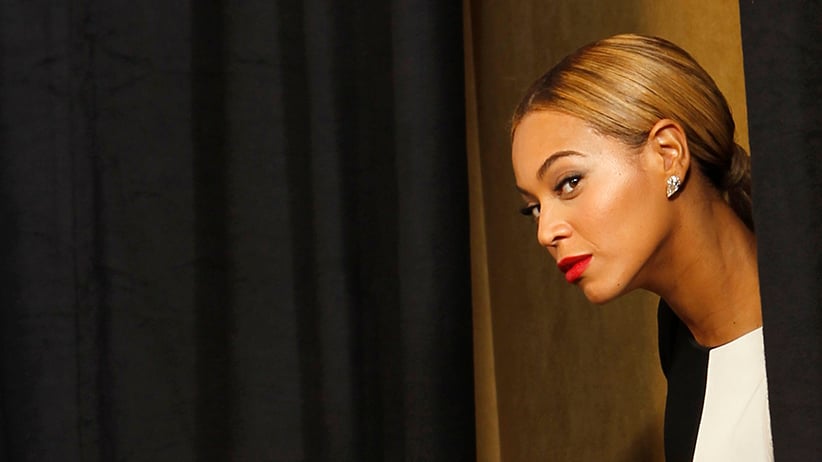Victoria to offer course on Beyoncé
Popular music scholar Melissa Avdeeff explains the value of studying a popstar
Beyonce looks out at the photographers as she comes backstage to pose with her award for Best Traditional R&B Performance for “Love On Top” at the 55th annual Grammy Awards in Los Angeles, California February 10, 2013. Mario Anzuoni/Reuters (UNITED STATES – Tags: ENTERTAINMENT) (GRAMMYS-BACKSTAGE) – RTR3DMAO
Share

Melissa Avdeeff, a popular music scholar, will teach a course on Beyoncé Knowles next year at the University of Victoria. It’s such a popular offering that the number of seats has already been upped from 70 to 100. Avdeeff wrote about Beyoncé for her M.A. thesis at McMaster University before doctoral work at the University of Edinburgh. Maclean’s spoke to her Friday morning.
Why this course? Why Beyoncé right now?
I’m just using Beyoncé as a case study, as kind of a gateway to popular music studies. So it’s introducing students to the popular discourse of popular music studies and applying it to a specific artist.
Can you explain?
Popular music studies is very interdisciplinary so we look at sociology, music studies, media studies.
As an example, we’ll look at feminist studies using video analysis. So we’ll take Beyoncé’s videos, and [apply] this concept quite well-known in feminist and media studies called “the gaze.” We’ll ask, who is Beyoncé dancing for? Who is supposed to feel empowered and not empowered by watching her videos? Especially in hip-hop and R&B there’s this idea that the women are just there for men to look at. Beyoncé complicates that because some call her a feminist. I want to look at that. Is what she’s doing empowering her or is it just there for male pleasure?
Another thing [the course will explore] is authenticity. There are these implied value judgements that if you’re a rocker, you’re authentic and you’re sincere and you’re presenting your true self to the public, whereas pop stars are kind of implied to be inauthentic, it’s more of an act, it’s entertainment. As an academic I like to challenge these things. Why does entertainment have to be a bad thing? Why can’t it be good? So we’ll be challenging these stereotypes and thinking about how we can critically engage with what we’re consuming.
Some people have questioned the legitimacy of such a course. Do you think if you chose a different artist there might be less criticism about the potential rigour?
Oh totally. There’s even a course at UVic right now on the Beatles. If you chose the Beatles or the Rolling Stones or even someone like the Beach Boys, who have this so-called credibility in the art world, it would be much less problematic, I guess you could say.
Those are the bands my dad loves, I think.
And that’s what makes “authenticity” worthy of discussion.
Can you outline how big [popular music studies] has become? Are there more programs and courses out there than there used to be?
There are. I did my Ph.D. research in the U.K. so I’m mostly familiar with their programs. I know Brock [in St. Catharines, Ont.] has a very good popular culture program. Most of the activity is happening in the east, like Ontario. Not so much in the west, which is something I’d like to change in the future. It’s been around since the ’80s and I think because it’s so interdisciplinary it confuses people. Should it be in a music program? A lot of them are in communications or media studies. In the future, I hope it becomes more structured.
Do you know of other courses out there where a particular cultural icon is used as a case study?
I don’t think there are a lot of them but a few years ago one got pretty famous: Lady Gaga and the Sociology of the Fame. That’s at the University of South Carolina. Same thing. They’re using Lady Gaga as a case study to study the sociology of fame. How do we consume it? How can we situate these people in society? I think there’s one on Beyoncé from a political standpoint. There’s also one about Miley Cyrus.
What are the big conversations going on right now related to popular music?
Because the field is so diverse, there are so many different areas in it. I’m mostly involved in the music and technology side of it, so conversations I’m having are mostly related to social media and how artists negotiate the fan-artist relationship on social media, how it’s changed how we interact with artists. I also look a lot at YouTube videos and how it’s changing what live music means. There are a lot of people who study semiotics and approach popular music semiotically. There are also some just looking for ways to talk about popular music that will make it, I don’t to say more credible, but more in line with other musicology.
How do you respond to criticisms that this discipline doesn’t count as much as history or English?
Any popular media—music, TV, anything—you can look at it as representing our society as well as perpetuating it. So it’s giving us a mirror. To better understand ourselves, we need to look at what we’re consuming.
This interview has been edited and condensed.